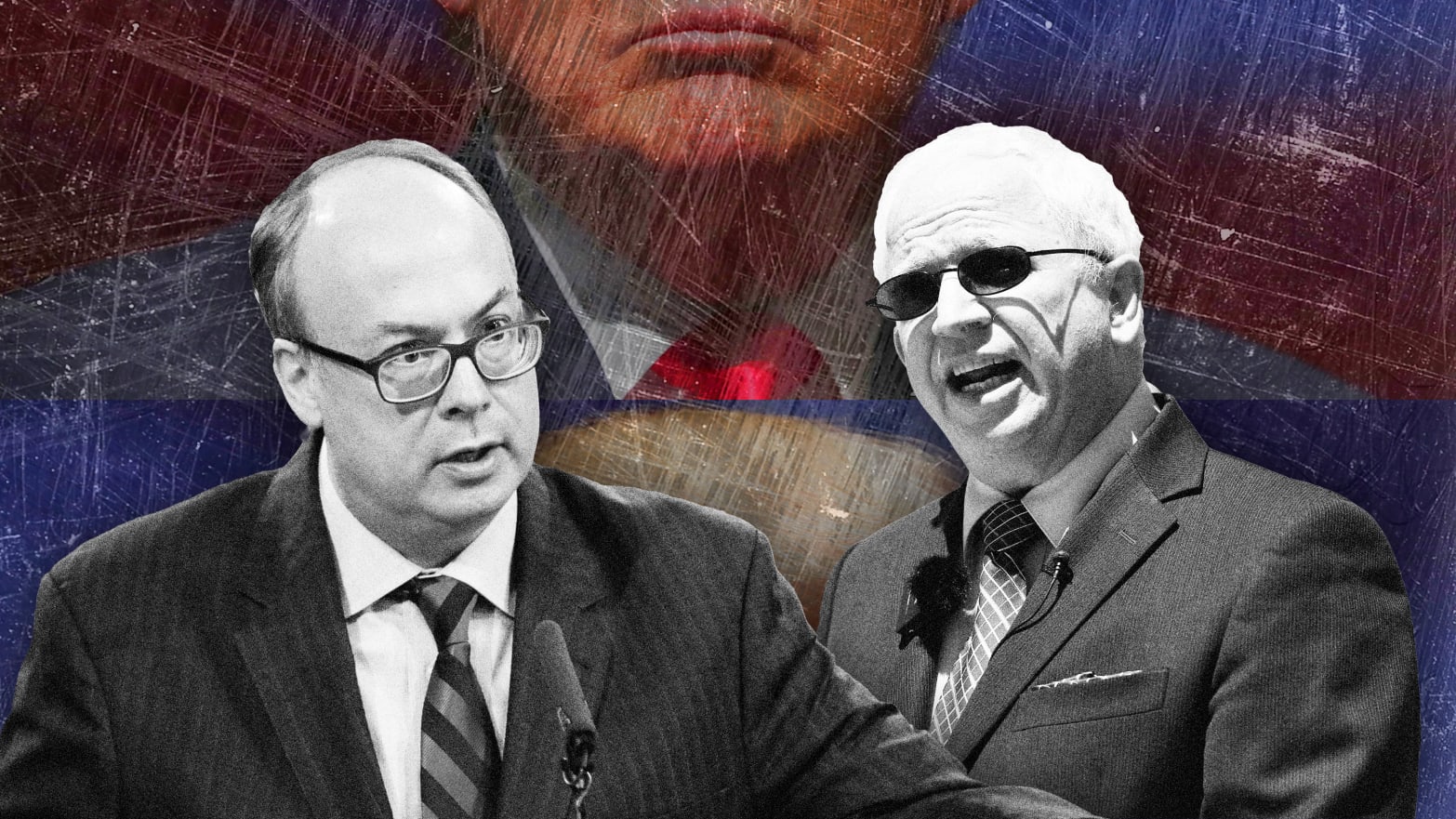As dirt keeps coming out on former President Donald Trump’s last-ditch attempts to cling to power, a portrait has emerged of how attorneys provided him absurd legal advice—that they knew to be utter folly—in a toxic mix of opportunism and appeasement.
Trump’s despotic strategy relied on two main parts: interrupting congressional certification of the electoral ballot count and spreading lies about Joe Biden’s victorious election results, according to the congressional committee investigating the Jan. 6, 2021 insurrection. Both were legal quagmires that flouted the U.S. Constitution—and Trump had a lawyer for each one.
John C. Eastman, a conservative legal scholar from California, came up with a plan that would interrupt the certification of Joe Biden’s electoral victory. But a hijacked recount required justification that the original election shouldn’t count. And that’s where the other lawyer came in: Jeffrey Clark, a high-ranking Justice Department official who was willing to use the nation’s top law enforcement agency to intimidate state-based officials and cast doubt over election results.
“It was very unfortunate that Trump had advisers who fed him nonsense about the election results and widespread ‘fraud,’ when the evidence—after a reasonable period of inquiry—did not justify those claims,” Ty Cobb, a former top Trump White House attorney, said in a brief interview. “I think the persisting in those claims, what has become known as ‘the Big Lie,’ was responsible for the tragic consequences of Jan. 6, and that only served to further polarize and divide the country in a way that, frankly, I view as dangerous and the gravest domestic threat to the country at present. There doesn’t appear to be leadership on either side that is likely to bridge the divide.”
Eastman guided the president during the final days before the Jan. 6 vote by crafting a plan that claimed—incorrectly—that Vice President Mike Pence could single-handedly refuse to count the legitimate electors from seven key states Trump lost. At the time, Eastman privately confided in Pence’s legal advisor, Greg Jacob, that the U.S. Supreme Court would inevitably rule that action unconstitutional. Jacob recounted the conversation during his sworn deposition before the committee last month, according to a transcript.
"If this case got to the Supreme Court, we'd lose 9-0, wouldn't we, if we actually took your position and it got up there?" Jacob recalled asking Eastman.
"Yeah, all right, it would be 9-0," Eastman eventually responded, according to Jacob.
Emails made public last week in court by the committee show that Jacob lashed out at Eastman during the tense hours when the vice president and his team found themselves in the U.S. Capitol building while it was under attack by violent Trump loyalists.
“The advice provided has, whether intended to or not, functioned as a serpent in the ear of the President of the United States, the most powerful office in the entire world. And here we are,” Jacob wrote to him. “Respectfully, it was gravely, gravely irresponsible for you to entice the President with an academic theory that had no legal viability, and that you well know we would lose before any judge who heard and decided the case. And if the courts declined to hear it, I suppose it could only be decided in the streets.”
Jacob criticized Eastman for using his access to the president to entertain “far-flung theories… in an incredibly constitutionally fraught moment” instead of remaining grounded in reality.
Despite being called out, Eastman actually continued to push for what he himself acknowledged to be clearly illegal behavior from the vice president—engaging in a delay tactic to toss the election back to Republican-controlled state legislatures.
“I implore you to consider one more relatively minor violation and adjourn for 10 days to allow the legislatures to finish their investigations,” Eastman said, referring to the conspiracy-charged political probes by Republicans desperate to find evidence of widespread voter fraud that didn’t exist.
Douglas Letter, the top attorney for the House of Representatives, referred to that enticement to break the law at a federal court hearing on Monday in the committee’s ongoing attempt to get more of those emails.
"I don't see how that can be legal advice," Letter said. “Vice President Pence should violate the law. That's what Dr. Eastman said. Violate the law and let them sue. Boy, that's not legal advice that I've ever given.”
Eastman’s conduct during the Trump-Biden transfer of power perplexed, or appalled, some of his friends and now-former colleagues. Multiple sources who worked with or have known Eastman for years uniformly told The Daily Beast this week that they simply did not buy, based on their personal interactions with Eastman over the years, that the attorney actually believed what he was pushing to then-President Trump.
One conservative lawyer who worked with Eastman during the tumultuous 2020-2021 presidential transition said it was “probably around zero to maybe 1 percent, in my view, that…Eastman would be dumb enough to believe all that.”
But some of those working in the upper echelons of the Trump administration in late 2020 and early 2021 had a more charitable view of Eastman’s actions. According to a former senior Trump administration official, one common view among officials in then-Vice President Pence’s office was that Eastman was “an academic who thought this was just a novel exercise. He didn’t appreciate the gravity of a potential constitutional crisis.”
It’s unclear how Eastman was compensated for the task of helping Trump, given that he is not listed as having received any direct payments in documents filed with the Federal Election Commission, but the plan positioned him to be the architect behind the legal machinations that sought to keep him in power.
Meanwhile, at the Department of Justice, Clark was intent on leveraging his efforts on Trump’s behalf into a promotion. Internal emails show Clark was eager for the department to approve his draft letter to Georgia state officials claiming the Justice Department was “investigating various irregularities” and asking the governor and legislature there to “convene in special session” and hear testimony about made up election fraud claims.
Writing to his bosses, acting Attorney General Jeffrey A. Rosen and acting deputy AG Richard Donoghue, Clark openly debated whether he could sign the inappropriate letter with his new, higher title. Clark childishly toyed with the idea of using that as an opportunity to give his old deputy a nudge too.
“I continue to think there is no downside with as few as 23 days left in the president’s term to give Jon and I that added boost in DOJ titles,” Clark wrote.
That deputy, Jon Brightbill, is now in private practice at Winston & Strawn. His law firm profile says he was the acting assistant attorney general for the DOJ’s Environment & Natural Resources Division, where he “led ENRD’s 425 lawyers, overseeing 6,500 active matters and managing an annual budget of more than $150 million.” He was in that position for a month.
As for Clark himself, his attempts to use the menacing draft letter to ingratiate himself with Trump—and elevate himself to the nation’s attorney general—backfired when his direct bosses at the DOJ all threatened to quit in unison. Last week, the Jan. 6 committee publicly revealed snippets of Donoghue’s sworn deposition in which he recalled the way he and others tore Clark to shreds at a tense Oval Office meeting during Trump’s final days in office.
When Clark argued that his experience on environmental cases made him qualified to be top lawyer in the country, Donoghue remembers responding, “That's right. You're an environmental lawyer. How about you go back to your office, and we'll call you when there's an oil spill."
Eastman and Clark are now facing potential disbarment in California and the District of Columbia, respectively. If they do, they’ll follow in the footsteps of Giuliani, who was disbarred in New York and the nation’s capital last year.
Whether or not Eastman and Clark knew they were pitching Trump absolute hogwash (and then pitched it anyway) is almost beside the point. They were merely two men in a vast array of many who were eager to promote the same drivel, in order to remain in Trump’s good graces.
In the earlier days of his anti-democratic crusade that began right after Election Night 2020, Trump would discuss with senior administration officials and aides some of the nonsensical ideas he’d heard from Rudy Giuliani, Sidney Powell, and several other key election deadenders. Trump was getting inundated with theories (however baseless and lie-heavy) from a band of committed Trumpists, and wanted to get advice on what his other advisers thought of the theories, and what they thought of Powell, Giuliani, and company.
On a number of occasions in that brief time period, according to three people familiar with the matter, the then-president was told that Powell and the other election denialists were “crazy,” or opportunists who were just telling him what they thought he wanted to hear. Trump was warned that Powell and the gang were trying to sell him on something that was doomed in a courtroom.
Trump would often respond to this early counsel with phrases such as “maybe you’re right,” “I guess you might be right,” or even “I guess you’re right.”
But as the post-election days dragged on, it didn’t matter. Trump was all-in on his “fraud” and “rigged election” propaganda, and he jumped on virtually every opportunity or fanatic proposal.
In his final months in office, Trump was surrounded by lieutenants and sycophants willing to take his multi-pronged effort to its logical, menacing extremes. People of influence close to Trump who didn’t believe a word of it played along anyway, and often actively worked to support the outgoing president’s bogus claims.
According to the knowledgeable sources, Jared Kushner, Trump’s son-in-law and senior White House aide, privately admitted that a lot of what Trump’s lawyers were pushing was a fraud and farce. Nevertheless, Team Trump continued to hold up Kushner as an example of a supposed true-believer—despite his obvious lack of commitment to the cause.
“Jared has been more hardcore in fighting back on this [election outcome] than anybody,” Trump’s then-senior adviser Jason Miller told The Daily Beast in early November 2020.
Not long after the 2020 election, one of Trump’s top personal attorneys, Jay Sekulow, told people in the MAGA orbit that he did not believe the conspiracy theories that some of the other lawyers on the Trump train were spreading, and therefore wanted to distance himself from that effort, according to two former administration officials.
Sekulow’s apparent defection is particularly noteworthy as he was tentatively tapped by Trump to co-lead the post-election legal team in the weeks leading up to the 2020 election.
“My role was extremely limited, it was about the constitutional issues regarding changes in laws by judicial decree, and then I was done and it was over very quickly following the election,” Sekulow told The Daily Beast on Wednesday. “I was never on the Rudy/Sidney team. I was President Trump’s private counsel, but I did not have direct access to [Rudy and Sidney’s] information. But what I was gleaning did not indicate to me that what they were alleging was provable.”
Similarly, top aides on Trump’s reelection campaign, including his 2020 campaign manager Bill Stepien, also—again, privately—expressed their conclusion that the legal challenges were doomed and that the MAGA lawyers’ work was built on little more than embarrassing conspiracy theories. And yet, they pretended not to be embarrassed, and publicly claimed “we are here to support” Giuliani and his legal team, even as official campaign surrogates were freely admitting that Trump had lost, fair and square.
With more than a year’s distance from the bloody assault on the U.S. Capitol, vanishingly few prominent Republicans are willing to blame the ex-president for the riot, or admit that the Trumpists’ “stolen election” lies have no basis in reality. The small number of conservatives who do, though, often do not spend much time publicly calling out Trump by name, despite the fact that he was responsible for all of it.
Instead, they generally reserve their scorn for a handful of aides and lawyers—the Eastmans and the Clarks of the world—who did their best to protect and enable Trump.
Last month, during an appearance on NBC’s Meet the Press, Pence’s former chief of staff told host Chuck Todd that the president received bad legal advice—but he wasn’t sure if this was merely a case where Trump simply heard exactly what he wanted to hear.
“I think, unfortunately, the president had many bad advisers that were basically snake oil salesmen giving him really random and novel ideas as to what the vice president could do,” Marc Short said.


